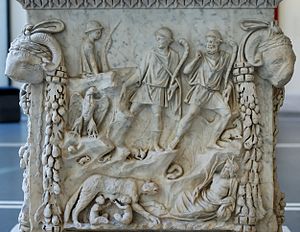
Some of the major Roman Gods include Venus (the love and fertility goddess), Pluto (god of the underworld and riches), and Mars (god off fertility and war), who is mentioned in a previous blog of mine is the supposed father of Romulus and Remus. Some prevalent values seen in the major gods of Roman mythology are wisdom, strategy of war vs. bloodshed, arts and crafts, marriage, childbirth, and honored chastity. These values of the “major” Roman gods in Roman mythology reflect the larger values, themes, or concerns of that society.

(take note of Romulus and Remus below the gods in the left bottom)
Now the “minor” gods, on the other hand, show us the less concerning ideas of the Roman society. Some of the minor gods include Moirae (the three goddesses of fate), and Cupid (who when mixed eros and chaos created the universe). Some other things that the minor gods were gods of were discord, season, and good fortune. These “minor” gods, not only show ideas possibly less valued by Romans, but also seem to have similar themes. Only from my observations, these stories of minor gods revolve around consistent things (fortunate times and bad times, seasons etc.).
 Romans, like many other cultures had explanations for the seemingly unexplainable. Such myths include Helios, who drives a chariot with 4 fire-breathing horses across the sky each day. This might explain the consistency in sunrise, sunset, and why the world goes around.
Romans, like many other cultures had explanations for the seemingly unexplainable. Such myths include Helios, who drives a chariot with 4 fire-breathing horses across the sky each day. This might explain the consistency in sunrise, sunset, and why the world goes around.
From mother to children, friends and society, these myths were kept alive. They were satisfying explanations. Are the similarities/differences between us and other modern cultures similar to the Romans to Greeks (being transmitted through myth as they reflect the cultural values and explanations that society is looking for?)
It seems as though myths were brought about to satisfy people's need to know what was going on in their world. Humans are very curious beings and we want to know the answers to our questions. Now that we have a more science-based society, are myths becoming less important in our lives? I find it hard to find many myths that we have created, but maybe that's because I have grown up with them. I think that if we do still have myths, that they are not really there to explain a phenomenon, but to show how we should act or behave in society.
ReplyDeleteMaddie, thanks for the look at why myths came to be. Looking back at them it seems logical that they were created to explain natural phenomena. However, unlike Emily I think that these phenomena extend to include not only elements of the natural world, but the phenomena that society creates as well. I also think that we still perpetuate "myths" of our own, they just don't always seem as "outrageous" as the ones about flaming horses pulling chariots of fire. When is the last time you heard a "three nephite" story?
ReplyDeleteI agree with Erin. To me, myths both explain phenomena and explain the culture of the society that creates them. Or rather, they explain a part of the culture. For example, my friend told me how in Spokane there is a myth that if someone flashes their lights at you, there is someone in your backseat trying to stab you. Because of this, she always freaks out when someone flashes their lights. Myths can explain behaviors that are a part of cultures.
ReplyDelete